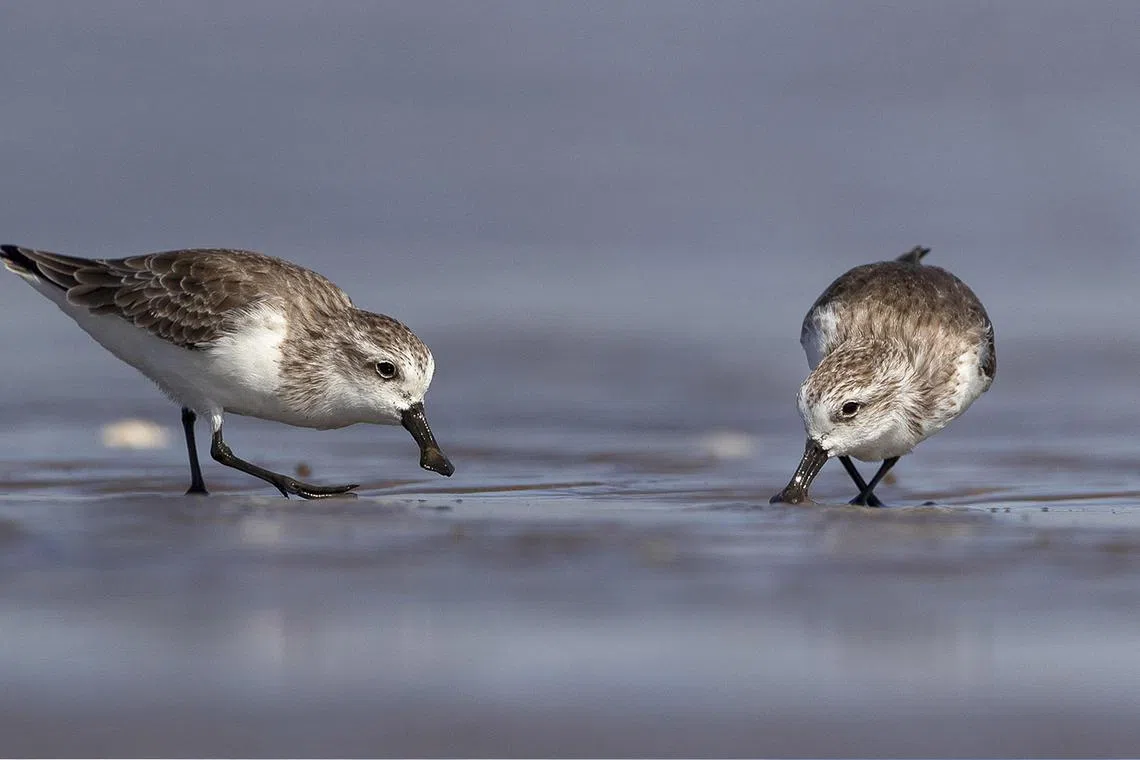Ukraine war disrupted global conservation, may have spillover effects on migratory birds in S’pore: Experts
Sign up now: Get ST's newsletters delivered to your inbox

The spoon-billed sandpiper, a highly threatened species, breeds exclusively in Russia and migrates to South and South-east Asia.
PHOTO: THUAN VO
SINGAPORE – While the devastation of war in Ukraine on communities has been widely publicised, a new international report found that damage from the conflict has extended into the realm of animals.
Published in the Frontiers In Conservation Science journal on Feb 15, the report said the isolation of Russia from global agreements due to the war has led to the prioritisation of security interests in favour of conservation goals and disrupted international cooperation on conservation.
This deterioration of conservation efforts can have ripple effects on the animals that migrate from Russia, including birds that head to Singapore, said Dr Eduardo Gallo-Cajiao, the study’s lead author.
“Russia is among the countries that have signed the most international environmental agreements, (including) holding key leadership roles... There is evidence that some of these agreements and processes are now in danger as a result of the war,” he said.
For instance, Russia took over the Arctic Council’s two-year chairmanship in May 2021, pledging to launch regional cooperation initiatives to reduce greenhouse gas emissions.
However, since the war broke out in February 2022,
Russia has also rolled back and put on hold key biodiversity conservation policies in the wake of the war, said Dr Gallo-Cajiao, as economic activity takes priority amid harsh western sanctions.
“The impacts on ecosystems and habitats within Russia may not be seen immediately, and hence the impacts on birds travelling to Singapore may not be visible immediately... But it is within this context that the war in Ukraine can have ripple effects on some of the birds that migrate to Singapore,” added Dr Gallo-Cajiao, a David H. Smith post-doctoral fellow at the University of Washington.
Dr Yong Ding Li, regional coordinator for migratory bird conservation at BirdLife International, who is based in Singapore, said: “Russian territory forms a large part of the East Asian-Australasian Flyway, which Singapore is a part of. Many species that winter in Singapore’s wetlands breed in ecosystems in Russian territory.”
However, due to the Russian suspension from many international frameworks and mechanisms, global efforts for migratory species’ conservation in the country have been undermined.
This is alongside travel restrictions, which have halted ongoing on-the-ground conservation efforts for the spoon-billed sandpiper, a highly threatened species that breeds exclusively in Russia and migrates to South and South-east Asia.
He said: “The international community has been trying to secure the breeding sites of these species, but sanctions implemented on Russia have the unfortunate side effect of stifling movement of resources to bird conservationists trying to protect these species inside Russia.
“The effective conservation of these migratory species within Russia is critical to the overall conservation of these species... (but) the disruptions to conservation activities over two years of the pandemic didn’t do much to help, and have impeded ground activities.”
Dr Gallo-Cajiao noted that conserving nature relies on international cooperation as birds and many other species do not abide by borders between countries.
“For over a century, countries from around the world have been building a system of agreements to cooperate internationally for nature conservation... This system of cooperation, however, is fragile and cannot be taken for granted,” he said.
“What is worryingly novel of our paper is that we usually think of the effects of war on nature as the direct effects of warfare on wildlife, habitats and ecosystems. However, what we exposed are the many additional nuances of how the war can affect nature through shocks to the very governance set up to protect it.”
He stressed: “We need to make sure international cooperation prevails, now more than ever, not only for the sake of conserving biodiversity, including the very migratory birds that visit Singapore, but also for the sake of ensuring countries work out their differences through agreements, talks and negotiations, not in the battlefields with huge human and environmental costs.”


